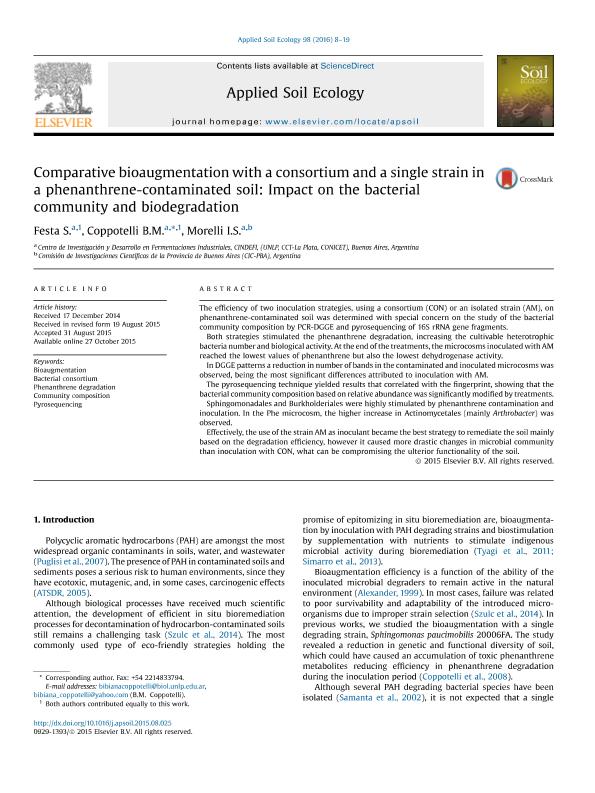Mostrar el registro sencillo del ítem
dc.contributor.author
Festa, Sabrina

dc.contributor.author
Coppotelli, Bibiana Marina

dc.contributor.author
Morelli, Irma Susana

dc.date.available
2018-06-19T18:42:37Z
dc.date.issued
2016-02
dc.identifier.citation
Festa, Sabrina; Coppotelli, Bibiana Marina; Morelli, Irma Susana; Comparative bioaugmentation with a consortium and a single strain in a phenanthrene-contaminated soil: Impact on the bacterial community and biodegradation
; Elsevier Science; Applied Soil Ecology; 98; 2-2016; 8-19
dc.identifier.issn
0929-1393
dc.identifier.uri
http://hdl.handle.net/11336/49379
dc.description.abstract
The efficiency of two inoculation strategies, using a consortium (CON) or an isolated strain (AM), on phenanthrene-contaminated soil was determined with special concern on the study of the bacterial community composition by PCR-DGGE and pyrosequencing of 16S rRNA gene fragments. Both strategies stimulated the phenanthrene degradation, increasing the cultivable heterotrophic bacteria number and biological activity. At the end of the treatments, the microcosms inoculated with AM reached the lowest values of phenanthrene but also the lowest dehydrogenase activity. In DGGE patterns a reduction in number of bands in the contaminated and inoculated microcosms was observed, being the most significant differences attributed to inoculation with AM. The pyrosequencing technique yielded results that correlated with the fingerprint, showing that the bacterial community composition based on relative abundance was significantly modified by treatments. Sphingomonadales and Burkholderiales were highly stimulated by phenanthrene contamination and inoculation. In the Phe microcosm, the higher increase in Actinomycetales (mainly Arthrobacter) was observed. Effectively, the use of the strain AM as inoculant became the best strategy to remediate the soil mainly based on the degradation efficiency, however it caused more drastic changes in microbial community than inoculation with CON, what can be compromising the ulterior functionality of the soil.
dc.format
application/pdf
dc.language.iso
eng
dc.publisher
Elsevier Science

dc.rights
info:eu-repo/semantics/openAccess
dc.rights.uri
https://creativecommons.org/licenses/by-nc-nd/2.5/ar/
dc.subject
Bacterial Consortium
dc.subject
Bioaugmentation
dc.subject
Community Composition
dc.subject
Phenanthrene Degradation
dc.subject
Pyrosequencing
dc.subject.classification
Bioremediación, Diagnóstico Biotecnológico en Gestión Medioambiental

dc.subject.classification
Biotecnología del Medio Ambiente

dc.subject.classification
INGENIERÍAS Y TECNOLOGÍAS

dc.title
Comparative bioaugmentation with a consortium and a single strain in a phenanthrene-contaminated soil: Impact on the bacterial community and biodegradation
dc.type
info:eu-repo/semantics/article
dc.type
info:ar-repo/semantics/artículo
dc.type
info:eu-repo/semantics/publishedVersion
dc.date.updated
2018-06-19T16:54:32Z
dc.journal.volume
98
dc.journal.pagination
8-19
dc.journal.pais
Países Bajos

dc.journal.ciudad
Amsterdam
dc.description.fil
Fil: Festa, Sabrina. Consejo Nacional de Investigaciones Científicas y Técnicas. Centro Científico Tecnológico Conicet - La Plata. Centro de Investigación y Desarrollo en Fermentaciones Industriales. Universidad Nacional de la Plata. Facultad de Ciencias Exactas. Centro de Investigación y Desarrollo en Fermentaciones Industriales; Argentina
dc.description.fil
Fil: Coppotelli, Bibiana Marina. Consejo Nacional de Investigaciones Científicas y Técnicas. Centro Científico Tecnológico Conicet - La Plata. Centro de Investigación y Desarrollo en Fermentaciones Industriales. Universidad Nacional de la Plata. Facultad de Ciencias Exactas. Centro de Investigación y Desarrollo en Fermentaciones Industriales; Argentina
dc.description.fil
Fil: Morelli, Irma Susana. Consejo Nacional de Investigaciones Científicas y Técnicas. Centro Científico Tecnológico Conicet - La Plata. Centro de Investigación y Desarrollo en Fermentaciones Industriales. Universidad Nacional de la Plata. Facultad de Ciencias Exactas. Centro de Investigación y Desarrollo en Fermentaciones Industriales; Argentina
dc.journal.title
Applied Soil Ecology

dc.relation.alternativeid
info:eu-repo/semantics/altIdentifier/doi/http://dx.doi.org/10.1016/j.apsoil.2015.08.025
dc.relation.alternativeid
info:eu-repo/semantics/altIdentifier/url/https://www.sciencedirect.com/science/article/pii/S0929139315300780
Archivos asociados
